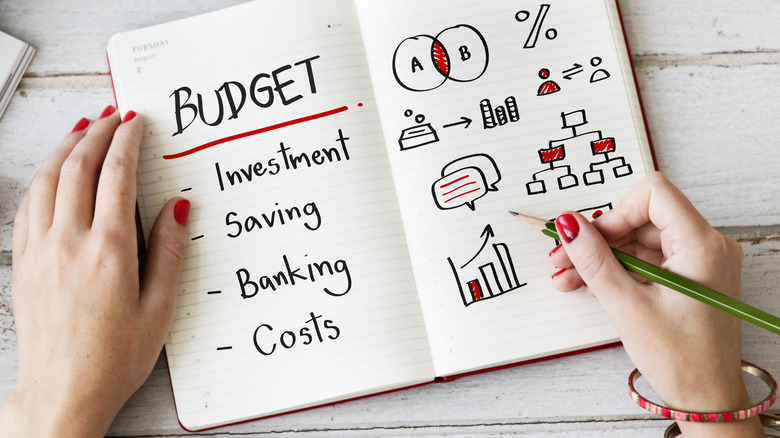Financial Self-Care: What Is It And How To Incorporate It Into Your Daily Life
Money — we love it, we love having it, we love receiving it. It's one of the most — if not the most — essential commodities we have, as it's fundamental to how we function not just as individuals, but as a society as a whole. People weren't lying when they said money does make the world go around.
But just as much as money can buy us the finer things in life, it can also cause worry and anxiety, considering its scarcity. Not everyone is fortunate enough to have the financial resources they need to live comfortably, so it's understandable that our feelings about money can sometimes be negative. In fact, financial stress is a real thing, with the American Psychological Association noting that money is a common cause of anxiety for people.
Now, there are many ways to address this, including taking careful stock of your financial situation and assessing all the ways you earn income. But as it turns out, there's also something called financial self-care that you can try to practice to achieve financial wellness. While self-care is often associated with treating yourself to the things you enjoy, financial self-care can help you be well on your way to financial freedom.
What is financial self-care?
Financial self-care seems to be a vague term, but it's actually pretty self-explanatory. Since finances can have a big impact on our health, it's important to take deliberate steps to ensure that money will not subject you to mental and physical duress.
"It's not nearly as glamorous or fun as long bath sessions, but having your money in order can free up time and energy and help you avoid stress," Melanie Lockert, the founder of MentalHealthandWealth.com, told HuffPost. She said that when you're starting to feel as though money is controlling your life instead of the other way around, it's best to take the proactive approach and start getting serious about money management and financial wellness to ease your worries. Even those who are doing fine money-wise can still experience financial stress. "For many people, the emotional weight of finances exists even with only moderate debt and an okay credit score," Melissa Pancoast, the founder of financial care app The Beans, shared with Real Simple.
In a nutshell, financial self-care is all about staying on top of your financial situation. While the thought can be intimidating at first (no one really loves crunching numbers), doing so can have a positive effect on your health. Once you have your money affairs in order, you'll get to enjoy peace of mind and can redirect your focus and energy to other things that make you happy. Wouldn't it be nice to receive a paycheck and not stress too much about stretching every dollar?
Set financial goals first
There are innumerable ways to incorporate financial self-care into your daily routine, but for starters, you can begin with setting a goal so you have something you're working towards. That could mean paying off the credit card debt you racked up from your reckless days or saving up for, say, travel, a car, or a luxury item. The one thing you should be wary of, though, is setting goals that may be incredibly hard to manage. If you go overboard, you're more likely to fail. "One of the difficulties with goal-setting is 'all or nothing' thinking," Brittney Castro, a certified financial planner, told CNBC. "It's an extreme mindset, and when we do things like that, we set ourselves up for failure because we don't take into consideration all the grays of life."
There's nothing wrong with starting small, especially when you're just starting out. In fact, it's encouraged. Small goals are easier to achieve, and when you do surpass them, you'll feel more motivated and confident to tackle your subsequent aims.
Perform regular account checks
Once you've established goals, you can then start a financial self-care routine, which The Balance notes should include regular bank account checks. This way, you're aware of where your money goes and can pinpoint areas of improvement, which can then help you cultivate financial habits that work best for your lifestyle. It doesn't even take more than 10 minutes out of your day. Checking your accounts on the regular allows you to assess how much and how frequently money is going in and out, and it lets you discover if there are expenses or charged fees that went unchecked. It also lets you keep track of the deposits you expect to get, whether you've received them or if they're overdue.
Plus, it goes without saying that having a clear idea of how much is in your bank helps you ensure that you're not going over budget. If you've noticed that you're spending beyond what you've previously set, take it as a sign to go back to the drawing board, assess your budget, and rework it in a way that fits your goals.
Set realistic budgets
Just like goal setting, your budget should also be realistic. You can't expect to stick to it if it's not doable from the get-go. It also doesn't have to be too complex that you'll have a tough time managing it. "A budget doesn't have to be complicated," Ken Lin, founder of Credit Karma, shared with Real Simple. "You have control over how your budget is structured. The key is to set realistic parameters for your money so you don't spend money you don't have."
There's also no gold standard when it comes to budgeting. The most important thing is to make sure that it works for you. It could mean sticking to the tried and tested 50/30/20 budget method where 50% of your income goes to bills, 30% to wants, and 20% to savings, or it could be a more custom approach depending on how much you're earning and spending. Your budget need not be fixed and can be regularly adjusted as you increase your income and cut back on expenses.
Don't forget to treat yourself
It's also important to note that financial self-care should be practiced consistently, even when you think you've already reached a comfortable place. The last thing you want is to slip up, so you have to keep going at it even after you've attained your goals or achieved financial freedom. Of course, don't go overboard by depriving yourself of buying things that bring you joy. Saving is important, but your happiness should also be a priority. Balance, here, is key. Treating yourself is encouraged every once in a while! "You can be hypervigilant by checking the numbers too much," financial therapist Bari Tessler warned MBG Lifestyle. "It's like overwatering your garden — you can do too much."
You don't have to be overly restrictive when you're reaching your financial goals. Sacrificing your wants to save more money is commendable, but doing so every single time without leaving any room for enjoyment can only lead to burnout. As long as you're not breaking your budget and making unreasonable purchases, you shouldn't feel guilty about treating yourself once in a while.





